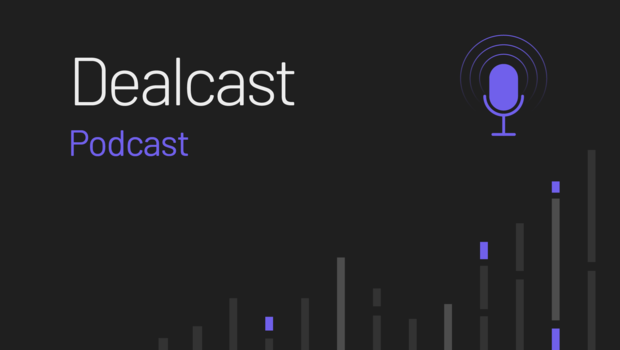2023 M&A: Are You Ready For What's Next?
3 February 2023
In this special episode, we’re joined by two guests who discuss noteworthy findings from the 2023 SS&C Intralinks’ Global M&A Dealmakers Sentiment Report 2023, a survey of 300 global corporate and private equity mergers and acquisitions (M&A) dealmakers.
First, we speak with Julian Fraser, an editor at ION Analytics, who worked on the report. Julian discusses the survey’s methodology and outlook for the next 12 months. He tells us, “Every type of dealmaker will have to navigate more fraught due diligence processes in 2023, particularly in relation to ESG scrutiny.”
Next up is Matt Wells, vice president of global product marketing and strategy at SS&C Intralinks. Discussing the results of the survey, Matt says, “I think dealmakers are focused on what will be a more ‘normal’ year. The reason for optimism, in my opinion, is the fact that all economic and geopolitical issues are out on the table and out in the open. Dealmakers are more focused on how to live with them and navigate around them versus wondering when the next issue will arrive.”
Listen to learn about:
- Why dealmakers are largely optimistic despite global challenges
- Why 64 percent of private equity surveyed expect to do a deal in 2023
- Key M&A drivers and challenges
- Expectations for restructuring and distressed dealmaking
- The importance of deal automation, synergies and digital transformation
- ESG’s growing prominence and challenges in cross-border M&A due to standardization issues
Dealcast is presented by Mergermarket and SS&C Intralinks.
Transcript
[MUSIC PLAYING] JULIE-ANNA NEEDHAM: Welcome to Dealcast, the weekly M&A podcast presented to you by Mergermarket and SS&C Intralinks. I'm Julie-Anna Needham, a business journalist who's been covering M&A for a decade. In this special episode, we're discussing the key findings from SS&C Interlinks' Global M&A Dealmakers Sentiment Report 2023. Julian Fraser is an editor at ION Analytics who worked on the report.
JULIAN FRASER: So last year we conducted a survey of 300 dealmakers from around the world, including the Americas, EMEA, and Asia-Pacific, chatting to them all over the phone, which we feel really is the best way to get the most fruitful results and most interesting qualitative comments. 3/4 of those respondents were from corporates, with the remainder hailing from private equity firms. Collectively, those executives have a tremendous range of expertise across key industries, from tech and energy to financial services and consumer, and well, everything in between really.
And, I suppose, the impetus for the study was to examine shifts in deal-making sentiment globally, particularly coming off the rip-roaring activity that we saw in the year before, when all those post-pandemic animal spirits were released. There's a lot for executives to fret over, some of it really rather familiar even then, from digital transformation to supply chain disruption, but then, of course, the war in Ukraine as well. So we posed questions to our respondent group dealing with all of those matters and their expectations for the key drivers of M&A, the hurdles they'll have to overcome, and how best to mitigate risk, and so on.
Given all the tumult, it seems as though dealmakers in the private equity, VC, and hedge fund space are the best place to capitalize on buying opportunities in 2023, largely because these organizations are still sitting on an absolute treasure trove of dry powder. They simply cannot spend it fast enough, they cannot allot it quickly enough. Whereas others organizations will have to reckon more directly with these tougher financing conditions. And every type of dealmaker, though, are responsibility is going to have to navigate more fraught due diligence processes in 2023, even if you are sitting on all that money, particularly in relation to increasingly strict ESG scrutiny.
For all these issues, and all the things to fuss about, and worry over-- every day you read the newspaper, that's something new to worry about and for all that-- dealmakers are broadly optimistic. They are forecasting an increase in M&A over the coming 12 months. Now last year was down slightly from the incredible pace set in 2021, but still beat expectations. So to forecast an increase from that is, I think, well, very bullish.
JULIE-ANNA NEEDHAM: Joining me to discuss this further is Matt Wells, vice president for product marketing at SS&C Intralinks. Hi, Matt. Thanks very much for joining me today.
MATT WELLS: Great to be here.
JULIE-ANNA NEEDHAM: So let's start by looking at the year ahead and can you tell us why dealmakers are so optimistic?
MATT WELLS: Yeah. It may seem a bit counterintuitive or surprising to see the amount of optimism that the survey uncovered. But with the outlier that was 2021 behind us and now 2022 also in the past, I think dealmakers are focused on what will be a more normal, and I use air quotes there, year this year. In fact, the survey showed that almost 2/3 of respondents expect overall M&A activity to increase in the year ahead, 23 percent of which forecast a significant increase.
Broadly, the reason for optimism, in my opinion, is the fact that all the economic and geopolitical issues are out on the table, in the open, and dealmakers are more focused on how to live with them and navigate around them versus wondering when the next issue will arrive. Many of the typical transaction drivers exist as they did in 2022. But I think there is a collective pause to catch our breath from 2021, understand the unique challenges that 2022 threw at us, and become comfortable with the playing field that 2023 will bring.
JULIE-ANNA NEEDHAM: Great. Thank you. Can you explain why private equity is likely to be the dominant force in M&A this year?
MATT WELLS: Absolutely. We can start with the obvious. And as of mid-December, private equity had over USD three trillion in dry powder by some estimates.
JULIE-ANNA NEEDHAM: It's going up-- it's going up since I last heard.
MATT WELLS: It continues to go up. We've been talking about this number for a long time now. I hear it mentioned in every panel discussion, podcast that you listen to, publication. And I think there's finally an expectation that, like we saw a little bit of in 2022, private equity will lead the way this year as there could be less competition for deals, more difficulties with financing, and likely a rise in add on acquisitions as private equity looks to shore up their portfolios.
There's pressure both internally and externally on many of these funds to deploy capital, as they look to raise new funds in the near future. And this is evidenced in our survey, where more than 64% of private equity dealmakers expect to execute four or more deals this year versus only 34 percent of corporate respondents citing the same. Both of these figures are up significantly from last year, showing an appetite for more deals and expectation for higher volumes this year.
JULIE-ANNA NEEDHAM: And looking at the next 12 months or the year ahead, digital transformation, synergy creation, and pursuing the diversification of products are seen as the main drivers for M&A. Do you agree with that, and is there anything else you expect to drive M&A?
MATT WELLS: Yeah. So I'm not going to argue with the dealmakers and I, yes, I do agree personally as well. While there are many reasons to engage in M&A, the accelerated trend of digital transformation as a growth and transaction driver doesn't seem like it's going to be going away anytime soon. Almost every business has a need or gap that can be addressed in this regard, with cybersecurity and data and analytics leading the way. The historical drivers like synergy creation and diversification are not a surprise to see rank high in the survey, as they'll always be primary reasons to engage in M&A.
One driver that you didn't mention in the list, that was well represented in the survey, was around restructuring and turnaround of distressed businesses. I think in the early part of the pandemic, there was a thought that there would be a wave of distressed opportunities coming. That never really materialized. And given the current environment dealmakers, 44% of them to be exact, expect these opportunities to drive their M&A activity in 2023. And that's up over 10% from the survey last year.
JULIE-ANNA NEEDHAM: And so can we look now at some of the disruptive trends that are impacting deal-making. Could you please talk through some of the trends and explain how dealmakers are able to keep up with them?
MATT WELLS: Yeah. The deal process is an ever-evolving one. Topics like deal automation, data analytics, cybersecurity, were hardly on the radar a decade ago, and now they're firmly planted in every dealmaker's mind. These trends continue to gain traction, for example, 68 percent of respondents said that deal automation will affect M&A processes in the next 12 months, where last year that figure was just 42 percent, so up significantly. Cybersecurity threats before, during, and after the deal process is also of particular concern, as there's been a sharp rise in cybercriminals targeting M&A deals to either profit off of them or hinder them. And 62% of dealmakers we surveyed, expect those attempts to continue or escalate in the year ahead.
JULIE-ANNA NEEDHAM: Yeah. And that plays into the trends that we mentioned in the previous question and answer. Another huge trend that we've seen, is ESG. And the survey shows that ESG continues to march up the agenda. With ESG issues facing more scrutiny than ever in M&A processes, what do you think that means for deal-making in the coming year?
MATT WELLS: This is another area that seems to grow more important and become more mainstream with each passing year. ESG has continued to grow and enter the lexicon of all dealmakers to the point now where pressure from investors, governments, customers, and employees have pushed dealmakers to consider ESG impacts of almost every single deal. A full 72% of survey respondents have now said they expect these issues to receive more scrutiny in the year ahead. This is an area where the response has showed significant regional nuance, with Europe far more focused on ESG versus a region like LATAM, where ESG is just getting a foothold. I believe we're still in the early stages of how ESG factors into deal-making, as standardization around the topic will make diligence easier and hopefully less costly in the future.
JULIE-ANNA NEEDHAM: And what — you mentioned the different regions there Europe and Latin America, what challenges does cross-border M&A have when it comes to ESG? I think the-- one of the things as we mentioned before is the standardization of practices, which you also mentioned in your answer
MATT WELLS: Yeah. I think there are quite a few challenges and regulatory chief among them, depending on the domicile of the acquiring entity versus the entity being acquired. There are quite a few hurdles to navigate again regionally, heavily regionally dependent. And I think due to some of the lack of standardization of metrics to look at, there is this topic called greenwashing, where the entity being acquired may be trying to paint themselves in a better light from an ESG standards perspective. And that may be often hard to read between the lines when doing diligence on these companies. So due to a lack of standardization, there is often some trouble navigating what the ESG picture actually looks like on many of these companies.
JULIE-ANNA NEEDHAM: Great. Thank you. Now you mentioned about the optimism of dealmakers at the beginning of the interview. But there are the challenges that we just can't escape from. We've got more complex due diligence, a challenging economic environment, and rising regulatory scrutiny. These are seen as some of the key challenges to M&A that the report flagged. Do you agree with those and what other challenges lie on the horizon for dealmakers?
MATT WELLS: Again, I agree with the sentiments of the dealmakers we surveyed here as well. There's no question that the financing environment will be more difficult than what we've been experiencing over the past several years. And with debt being a key component of most deals, this will have a big impact not only on valuations but also the ability to get some deals over the finish line. The boom of 2021 and sharply rising valuations has left many sellers with pretty high expectations that are likely-- are unlikely, actually, to be met in this market. Bridging those expectations and finding a way to close the gap will be key to getting deals done in 2023.
To ensure M&A dollars are being used wisely, almost 40 percent of respondents said that they'll be engaging in more comprehensive due diligence as a key priority, with 38 percent of respondents saying they'll actually start the deal preparation process earlier. And many will look to leverage newer diligence-related technology, such as AI platforms, to help with efficiency and comprehensiveness as they process an ever-growing amount of due diligence data.
JULIE-ANNA NEEDHAM: Great. Matt, it's good to talk. Thanks very much. That was Matt Wells, vice president for product marketing at SS&C Intralinks. Thanks for listening to this week's episode of Dealcast, presented by Mergermarket and SS&C Intralinks. Please rate, review, and follow the podcast. You can find us on Apple Podcasts, Spotify, or look out for your Mergermarket news alerts. For more information, have a look at our show notes. Join us next week for another episode.
[MUSIC PLAYING]


